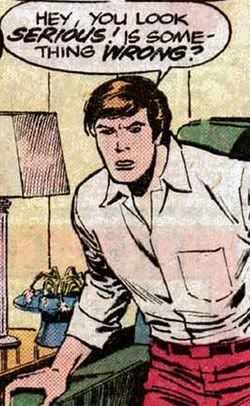
...this Bruce Banner...
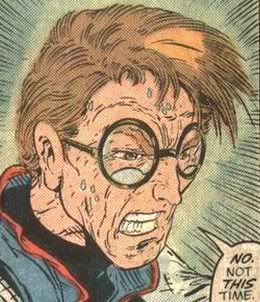
...and this Bruce Banner...
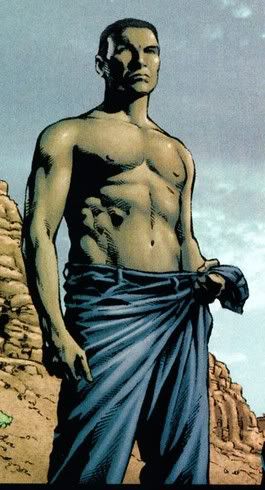
...are the same guy. Sorry, no dice.
I used to think this was something particular to comics, but then I got my nose out of the funnybooks and looked around. I realized I could see similar tendencies in season after season of Seinfeld and The X-Files. They were in spin-off-drunk franchises like Star Trek, Stargate, and Law & Order. They were in the horror movie franchises who, year after year, redefined what most of us accept as the meaning of the phrase "LAST summer." Now in online RPGs like World of Warcraft you can find games that never end, games that you can never really win, games that just keep going.
That's what's behind the idea of my weekly column The Whole Story. Every Tuesday I will look at either a comic book or TV series that ended, because its ending provides me with the uncommon opportunity to look at a series as an actual whole without provisos like "so far" or "up until now." I will probably be looking at more comics than TV shows, at least at first, simply because of time considerations. It takes less time to read 18 issues of Power Company than it does to watch 144 episodes of Buffy the Vampire Slayer.
For my first column, I chose a comic so good, it's a pure miracle of stupid that the thing didn't rake in enough dough to keep afloat, though I'm not sure that's necessarily a bad thing.
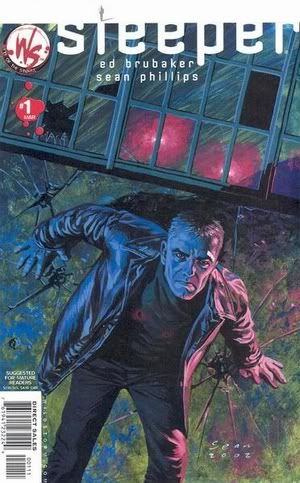
Sleeper, written by Ed Brubaker and illustrated by Sean Phillips, is the story of Holden Carver, a black ops bad-ass who was unlucky enough to encounter an alien artifact that gave him a deadly super-power. Holden soaks up physical pain without feeling it, and doles it out to others with the touch of his skin. Before the series begins Holden's commander John Lynch tasks Holden with infiltrating a vast, clandestine organization populated by super-powered criminals and headed by the mad genius Tao. Because of Tao's power and influence, Lynch tells Holden that no one but Lynch himself will know that Carver is undercover and no official record will be kept; to the rest of the world he's a traitor who murdered his brother soldiers. Holden kills and maims enough on Tao's orders to work his way up in the organization, but when John Lynch is shot and put in a coma, Holden faces three equally crappy options - wait to see if Lynch will wake from his coma, find a way out himself, or become the villain everyone - including, increasingly, Holden himself - believes him to be.
Sleeper opens with Holden confronted with one of the lethal choices he regularly faces in the series. Tao suspects one of his operatives is a mole. Tao orders Holden to find out the truth and to do "what needs to be done." When Holden learns Tao's suspicions are correct, he makes the only choice possible if he wants to stay alive, but it's the first in a long list of tough choices that sink Holden deep into a moral quagmire.
In the aftermath of a SNAFU involving Holden, the brutal strongman Genocide, the timid XXXRay, and the degenerate telepath Steeleye, Holden is promoted to Prodigal - a title reserved for only three of Tao's closest and deadliest operatives. The other Prodigals are Peter Grimm, a killer with the power to drive you insane with the touch of his finger, and the sadistic and alluring Miss Misery whose unique physical condition necessitates she commit acts of evil or else slowly die. Holden and Misery soon become lovers, and the fact that Misery's pure, unapologetic evil does nothing but turn him on helps to convince Holden that his murderous tendencies are less of an act than he realizes.
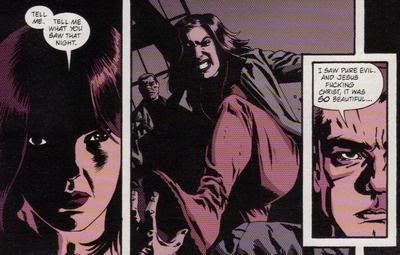
Holden's body count grows through wonderfully-rendered, John Woo style two-fisted gunfights with rival spooks and government sponsored superheroes. He fends off suspicions of Tao and his underlings while trying to just plain survive the bloody tasks Tao assigns him. Chances crop up for Holden to escape but are always ground into the dust. By the end of the first 12 issues Holden loses one of his closest friends in Tao's organization, he's captured by federal agents who don't believe he's a double agent, he learns Tao has known quite a bit more than he suspected, and the last page of the 12th issue ends with a reveal that may be Holden's only hope for salvation.
Sleeper: Season Two opens with Holden completely cut off from his original mission. He has given up all hope of escaping Tao's clutches and heads a group of killers known as The Hounds. But the recently awoken John Lynch still wants Tao taken out of the picture, and he's not willing to give up Holden to the other side. Soon Holden is playing Tao and Lynch against one another, trusting neither, desperately trying to find his own way out to something resembling a normal life. It's a bloody, suspenseful race to the finish and a nice chunk of the comic's recurring characters don't make it to the end. Holden's fate will, if nothing else, make you question what you can and can't really call a "happy ending."
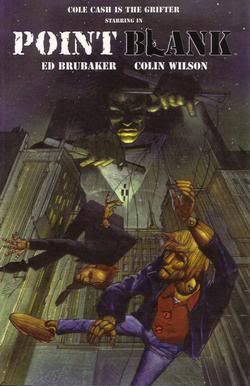 The story of Sleeper arguably begins in the limited series Point Blank in which the Grifter is manipulated into shooting John Lynch, but you don't need to read it. I had no idea Point Blank existed until I was halfway done with Sleeper. Nor did I know that recurring Sleeper characters like Tao and John Lynch had deep roots in the history of Wildstorm. You don't need to have read anything from Wildstorm to understand or appreciate Sleeper. Ultimately, whenever I consider recommending superhero comics to people who don't read superhero comics, Sleeper is one of the first that springs to mind precisely because the uninitiated don't need to see the wider canvas upon which the story is drawn.
The story of Sleeper arguably begins in the limited series Point Blank in which the Grifter is manipulated into shooting John Lynch, but you don't need to read it. I had no idea Point Blank existed until I was halfway done with Sleeper. Nor did I know that recurring Sleeper characters like Tao and John Lynch had deep roots in the history of Wildstorm. You don't need to have read anything from Wildstorm to understand or appreciate Sleeper. Ultimately, whenever I consider recommending superhero comics to people who don't read superhero comics, Sleeper is one of the first that springs to mind precisely because the uninitiated don't need to see the wider canvas upon which the story is drawn. Now the literal canvas upon which the story is drawn is cool. Sleeper just plain looks cool. The first thing you notice is the panel arrangement. Most of the pages feature one large picture with smaller panels drawn on top of the primary image. And the panels don't generally follow the normal left-to-right, up-to-down ordering. As you first get to a page, you might feel a little lost. You look at the panel arrangement and don't know which way to go. What surprises you is that, as you begin to read, your eyes figure it out on their own. There are no arrows like some of the 1970s or 1980s comics would regularly provide in the uncommon occurrences that the panels appeared in nonstandard orders. If you do mix up the order a bit, it usually isn't a problem. It just comes off like some kind of fast-paced cut-up style of film directing; something along the lines of Snatch.
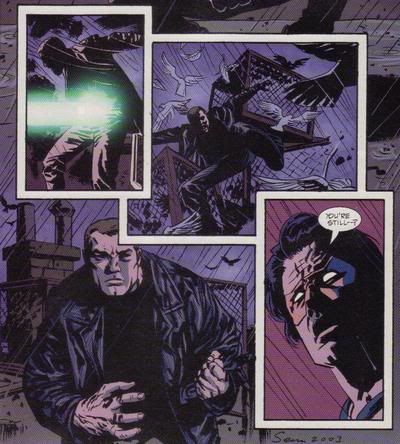
A single color dominates most pages, though that color changes; sometimes a pinkish red, sometimes a dark blue, etc. In part, this is purely functional. Most issues of Sleeper feature quick back and forth between flashbacks and the present, and changing the dominant color is an easy way for the creative team to do the Time Warp. When I tried to figure out if there was a thematic reason for the coloring, I looked to the pages on which there wasn't any single dominant hue. This is usually the case in most of the Origin Story flashbacks, it happens sometimes (though not always or even most times) when Holden is hanging out with his friends in the regular criminal dive, the Tird Street Arms (named "Tird" because of the broken H in the bar's neon sign), and we also tend to see it in the few situations where Holden isn't pretending to be loyal to Tao. This impression may be a mistaken one, but it gave me the sense that the closest we ever see of the real Holden Carver is when he's knocking back beers or knocking around 8-balls with his buddies Genocide and XXXRay in the Tird Street Arms. It makes me wonder, in light of all of the comic's bloody and tragic events, if given the choice, would Holden Carver have opted to just stay right where he was, doing the odd job for Tao but never rising to the rank of Prodigal, and occasionally retiring to the bar to chill out with his fellow spooks and killers?
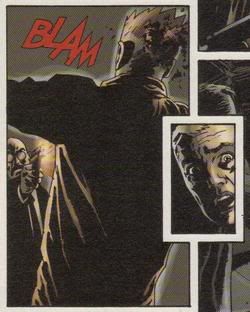 That brings me to one of the things I find most interesting about Sleeper. The pliability of our moral codes is one of the more overt themes of the series. It's something you're likely to find in just about any story involving undercover agents. At first we get the notion that in his capacity as a mole Holden only kills other bad guys, but then we see a picture of him hanging out of a helicopter, firing a missile at a commercial jet. We read him referring to stomping on the scorched skulls of children. One of Holden's botched attempts to escape Tao's organization ends with Holden shooting a truck driver in the head simply because he saw him. In particular, a lot of hay is made about the sameness between Tao and John Lynch; both manipulative bastards, both murderers, excepting nothing but the government stamp on Lynch's pursuits. At the same time, without getting specific and spoiling too much, quite a few of the friends Holden makes in Tao's organization don't survive to the final curtain, and we care. At least I did. I took the deaths of certain characters just as hard as I would've if they weren't sadistic, evil psychopaths. It reminded me of what I would occasionally consider when I watched The Sopranos. Tony Soprano would finally kill or otherwise handle a mobster who had been giving him grief all season, and after giving my silent "F%#$ yeah" to Soprano's victory, I'd wonder why I was rooting for the guy so hard. The character was unquestionably an unrepentant, evil prick. More often than not, so were his adversaries, but they didn't deserve death any more than he did. If a person like him, or like Holden or any of the friends he makes in Sleeper, had anything at all to do with my life, they'd probably be there to either ruin it or to end it. It makes me wonder if the real message in Sleeper about morality is that what threatens our moral codes the most is the familiar. We can grow to live with any evil as long as it doesn't come from strangers. What we will permit from our own friends and family is the same stuff we'll tsk-tsk while browsing the newspaper or watching a talk show. It's why fans of particular celebrities will excuse any acts the objects of their adoration commit. It's why Holden can mow down strangers without a second thought, but the deaths of the kinds of black-souled bastards who would find good company in the gallows of Nuremberg bring him to tears.
That brings me to one of the things I find most interesting about Sleeper. The pliability of our moral codes is one of the more overt themes of the series. It's something you're likely to find in just about any story involving undercover agents. At first we get the notion that in his capacity as a mole Holden only kills other bad guys, but then we see a picture of him hanging out of a helicopter, firing a missile at a commercial jet. We read him referring to stomping on the scorched skulls of children. One of Holden's botched attempts to escape Tao's organization ends with Holden shooting a truck driver in the head simply because he saw him. In particular, a lot of hay is made about the sameness between Tao and John Lynch; both manipulative bastards, both murderers, excepting nothing but the government stamp on Lynch's pursuits. At the same time, without getting specific and spoiling too much, quite a few of the friends Holden makes in Tao's organization don't survive to the final curtain, and we care. At least I did. I took the deaths of certain characters just as hard as I would've if they weren't sadistic, evil psychopaths. It reminded me of what I would occasionally consider when I watched The Sopranos. Tony Soprano would finally kill or otherwise handle a mobster who had been giving him grief all season, and after giving my silent "F%#$ yeah" to Soprano's victory, I'd wonder why I was rooting for the guy so hard. The character was unquestionably an unrepentant, evil prick. More often than not, so were his adversaries, but they didn't deserve death any more than he did. If a person like him, or like Holden or any of the friends he makes in Sleeper, had anything at all to do with my life, they'd probably be there to either ruin it or to end it. It makes me wonder if the real message in Sleeper about morality is that what threatens our moral codes the most is the familiar. We can grow to live with any evil as long as it doesn't come from strangers. What we will permit from our own friends and family is the same stuff we'll tsk-tsk while browsing the newspaper or watching a talk show. It's why fans of particular celebrities will excuse any acts the objects of their adoration commit. It's why Holden can mow down strangers without a second thought, but the deaths of the kinds of black-souled bastards who would find good company in the gallows of Nuremberg bring him to tears. If you haven't guessed already, Sleeper's a fairly dark superhero story, and in this sense it's refreshing. When it comes to Mature Readers superhero comics, a healthy amount of irreverence towards the older superhero stories is inevitable. They make fun of the goofy names, they make fun of the goofy costumes, and Sleeper is no different. What is different is that there's respect that goes along with Brubaker's irreverence. When a classically-spandexed super guy sails overhead, Brubaker has Holden think "Okay, who the fuck is this dweeb," but he also has that superguy descend from the clouds and beat Peter Grimm to within an inch of his life. Likewise, when Holden approaches the superhero Turbine hoping the crime-fighter will help him clear his name, as immersed readers we may not like how Turbine responds because our sympathy is with Holden, but Turbine's reaction makes sense. This may seem like a little thing, but as both a lover of older superhero stories as well as a discerning reader who doesn't find the same joke posed to him over and over again as funny and fresh as a lot of contemporary superhero writers find it, I'm tired of Superman clones posed as drooling degenerates with the expectation that I, the reader, think the writer is just so pop-culture-perceptive to figure out what the rest of us were too dumb to see. It has its place, but it doesn't have EVERY damn place.
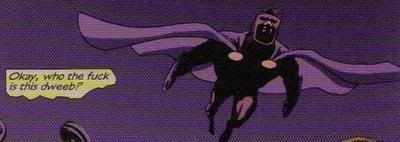
Brubaker initially expected the series to only last 12 issues. Those first 12 issues became known as Sleeper: Season One and were reprinted in the trade paperbacks Sleeper: Out in the Cold and Sleeper: All False Moves. When Wildstorm Executive Editor Scott Dunbier called him for another 12 issues, Brubaker had the idea of waking John Lynch up from his coma and so came Sleeper: Season Two whose stories you can find in Sleeper: A Crooked Line and Sleeper: The Long Way Home. But that was it. There were Eisner nominations and quotes from just about everyone in or outside the comics industry who read the thing that it was comicdom's best kept secret and that, for Hulk's sake, stop keeping the secret and make people buy the damn thing, but commercially it didn't have the numbers.
When I referred to its cancellation earlier as a "miracle of stupid," I meant it. The fact that more people didn't read Sleeper is just plain dumb. When Alan Doane interviewed him in 2006, Brubaker cited marketing and Sleeper's narrative connections to the Wildstorm universe - "a superhero universe on the wane at the time" - among other reasons, for Sleeper's cancellation, and he would know better than me. I just know, regardless of the reasons, it makes no sense. Sleeper had everything superhero comics readers wanted. It poked fun at older, cornier depictions of superheroes and their villainous counterparts. It was cool, dark, violent and sexy. And besides all of that, it was a genuinely great story. It was a perfect marriage of the superhero and espionage genres. And in an age when you could pick up just about any DC or Marvel offering and absorb the entire - increasingly expensive - comic in about 5 minutes, every chapter of Sleeper was its own, satisfying story.
But I meant the "miracle" part of "miracle of stupid" too because, while its lack of commercial support blows my geek mind, I'm not convinced Sleeper shouldn't have ended exactly when it did. Sleeper's concept wasn't open-ended. I'm sure Brubaker could have gotten more issues out of it, but Holden Carver's story wasn't one that was meant to stick around year after year.
I'm thankful for what we did get. Sleeper is about as close as you get to perfection in a superhero comic. Happily, Ed Brubaker and Sean Phillips have continued to work together on other comics like Criminal and Incognito. There apparently was talk two years ago of Sam Raimi and Tom Cruise working on a film adaptation of Sleeper, but I haven't found any mention of it on IMDB or anything really after 2008. Considering Spider-Man 3 and Tom Cruise being Tom Cruise, maybe it would be best if they take a page out of Wildstorm's book and just let it go.
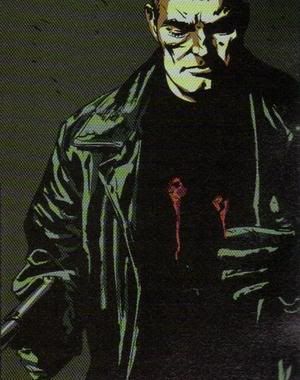

No comments:
Post a Comment